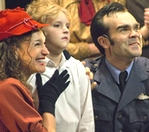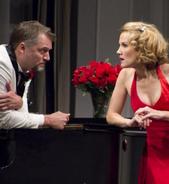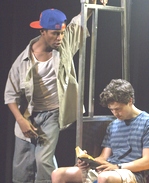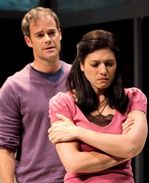SITE GUIDE
SEARCH
REVIEWS
FEATURES
NEWS
Etcetera and
Short Term Listings
LISTINGS
Broadway
Off-Broadway
NYC Restaurants
BOOKS and CDs
OTHER PLACES
Berkshires
London
California
New Jersey
DC
Connecticut
Philadelphia
Elsewhere
QUOTES
TKTS
PLAYWRIGHTS' ALBUMS
LETTERS TO EDITOR
FILM
LINKS
MISCELLANEOUS
Free Updates
Masthead
Writing for Us
CurtainUp in the Berkshires
The Berkshire Theatre Festival's Summer 2011 Season By Elyse Sommer
Main Stage Shows (an *asterisk next to a title indicates the show details include a review: - Tommy* | Sylvia* | In the Mood* Period of Adjustment*
Unicorn Stage Shows (an *asterisk next to a title indicates the show details include a review:Moonchildren | Dutch Masters* | Finian's Rainbow-- student production (non-reviewable)| Birthday Boy*
Berkshires archives . Also check out our Berkshires news page for news about theaters we don't cover or only occasionally— Berkshire news page and Berkshires Archives-links to past reviews and features .
Visit CurtainUp's Friends
Curtainup at Facebook . . . Curtainup at Twitter Subscribe to our FREE email updates with a note from editor Elyse Sommer about additions to the website -- with main page hot links to the latest features posted at our numerous locations. To subscribe, E-mail: esommer@curtainup.comesommer@curtainup.com put SUBSCRIBE CURTAINUP EMAIL UPDATE in the subject line and your full name and email address in the body of the message -- if you can spare a minute, tell us how you came to CurtainUp and from what part of the country. |
The Berkshire Theatre Festival and The Colonial Theatre This is the first season of the BTF and Colonia.. merger under the leadership of Kate Maguire. The Colonial Theatre in Pittsfield will continue to mount numerous one or two night music and comedy and events. However the merger of the two organization will will kick off with a longer, fully staged new version of a musical staged some seasons back at the uniform (see Main Stage productions)
Berkshire Theatre Festival
Stockbridge, MASS
413-298-5576
http://www.berkshiretheatre.org/ Berkshire Theatre Festival Main Stage performances are Monday, Tuesday, Thursday, Friday, and Saturday evenings at 8pm, Wednesdays at 7pm, with 2pm matinees on Thursdays and Saturdays. . Ticket prices for all events $15-$49 unless otherwise noted. Unicorn Theatre Perfomances
Ticket prices for all events $15-$39 unless otherwise noted. Performance schedule is Monday, Tuesday, Thursday-Saturday at 8pm, Wednesday at 7pm, Thursday and Saturday at 2pm unless otherwise noted.| Main Stage
Tommy
|
I'm free. . . I'm free. . .And I'm waiting for you to follow me!—-The adult Tommy, freed by his pinball wizardry to not only see, feel and sing, but to become an icon. |

Randy Harrison as the grown-up Tommy with Paige Walker the very young Tommy
|
Now, Eric Hill is at the helm and the show has been re-envisioned to fit the grandeur of the elegantly restored Colonial Theater. It stars two actors whose careers have flourished at BTF, Randy Harrison and James Barry. Harrison who was a riveting Alan Strang in Equs and Lucky in Waiting for Godot is an ideal choice to blow audiences away as the grown Tommy. Barry who was a BTF intern when he first played Captain Walker in that Unicorn Production and moved on to increasingly demanding roles and also distinguished himself in the Off and On Broadway versions of Bloody, Bloody Andrew Jackson . He is now a more mature Captain Walker in this brand-new and much larger scaled version of the once ground-breaking show.
If anyone is going to give this show the sizzle that made it an 899-performance Broadway hit twenty years ago, Eric Hill is the man. But no matter how praiseworthy this large cast and this director, this is summer theater and scheduling and finances dictated a strictly limited run. Consequently by the time I post more detailed comments, you'll have just two more chances to see this production yourself.

Jenny Powers, Paige Scott and James Barry as Mrs. Walker, young Tommy & Captain Walker
|
Eric Hill has more than lived up to my prediction that if anyone could really make Pete Townsend's rock opera rock again. With the help of scenic designer Gary M. English and the brilliant projection work of Shawn E. Boyle, he has made full use of the sky high stage as well as the Colonial's aisles and one of its beautiful loges.
Townshend's songs resonate powerfully. Whether you're too young or too old for The Who to be part of your youth, you'll recognize the enduring killer show stopping quality of songs like "See Me, Feel Me," "I'm Free," "Acid Queen," (a triumph for Angela Robinson), " Pinball Wizard" and the penultimate "We're Not Gonna Take It."
Garrry McIntyre choreography, David Murin's costumes and Matthew E. Adelson's lighting design make this a treat for the eyes as well as the ears. The cast overall — but especially the truly extraordinary Randy Harrison as the grown Tommy (and Narrator) and James Barry and Jenny Power as Captain and Mrs. Walker — taps into the emotional complexities of this epic story. Paige Scott and Connor McNinch are excellent as Tommy at 4 and 10.
Unlike most rock musicals in big houses, this one isn't cover-your-ears loud. The choreography, while highly energetic, doesn't look like an advanced, high impact aerobics class but supports the story. The projections abound with memorable images; for example, Captain Walker's war experiences that include his crew's parachute jump which has Barry and his crew descend into an opening in the stage while their parachute descent is projected above.
While Hill and his talented company have indeed made this Tommy sizzle as much, if not even more, than the 1992 899-performance Broadway production, this is an all-too limited run. Too bad Hill's wife Kate Maguire who's the Berkshire Theatre Group's CEO wasn't able to find a deep-pockets sponsor to support the longer run this show deserves — and that the Colonial Theater needs instead of all those one-night roadstops by various and sundry performers that have been its unprofitable mainstay.
Production Notes
July 7 to July 16th at the Colonial in Pittsfield.16th
Music and lyrics by Pete Townshend, book by Pete Townshend and Des McAnuff
Additional music and lyrics by John Entwistle and Keith Moon.
Directed by Eric Hill
Cast: Zi Alikhan (Pinball Lad/Ensemble), Jordan Barbour (The Specialist/Ensemble), Aaron Barcelo (Hawker/Ensemble), Chris Chianese (Lover/Pinball Lad/Ensemble), Brett Dameron (Pinball Lad/Ensemble), Rory Donovan (Minister/Mr. Simpson/Ensemble), Christopher Gurr (Uncle Ernie), Randy Harrison (Tommy/Narrator), Jaclyn Miller (Assistant to the Specialist/Mrs. Simpson/Ensemble Dance Captain), Jenny Powers (Mrs. Walker), Angela Robinson (Acid Queen), Ben Rosenblatt (Cousin Kevin/Ensemble), Hannah Shankman (Sally Simpson/Ensemble). Ensemble: Hallie Brevetti,Emily Brown, Rebecca Leigh, Connor McNinch, Paige Scott, Brain Scannell, Tessa Hope Slovis, Christopher-Michael Vecchia, Margaret Wild.
Choreography by Gerry McIntyre
Running Time: 2 hours with one intermission Monday, Tuesday, Thursday-Saturday at 8pm, Wednesday at 7pm, Thursday and Saturday at 2pm
Production Photos: Christy Wright
Reviewed by Elyse Sommer
|
Musical Numbers
| |
Act One
|
Act Two
|
Sylvia
|
A man and his dog is a sacred relationship. What God and nature have joined together, let no woman put asunder.—Tom.
|

David Adkins and Rachel Bay Jones
(Photo: Jaime Davidson) |
If Sylvia sounds like a case of whimsy gone overboard and a rather slight entry in Gurney's deeper delvings into WASP mores and manners, it is. This anthropomorphic conceit in which Sylvia and Greg's meeting in Central Park is a case of Love at first nuzzle, with Sylvia's thoughts are expressed through interaction with Kate as well as Greg does descend into sillyness and if, like me, humans playing animals, no matter how charming and smartly theatrical the fantasy, are not your coup-de-theatrrical tea, best keep your eye out for Edward Albee's similarly titled but quite different The Goat or Who Is Sylvia?.
Yet, as Mr. Gurney's gentle, always entertaining WASP exposés had serious underpinnings, Sylvia's bark too has its bite. After all Greg wouldn't have been such an obvious patsy for the flirtatious feline if he weren't playing hooky from a job he no longer enjoyed and everything else in his life was prone to that fragile state known as mid-life crisis. Thus, while Sylvia is silly, light-hearted fun, it isn't quite as totally about nothing as the Seinfeld TV show. No wonder It's been a dependable crowd pleaser at countless community and regional theaters ever since the first time the talking labrador-poodle (played by Sarah Jessica Parker) licked and wiggled herself into Greg's (Charles Kimbrough) heart and into his and Kate's (Blythe Danner) neat empty nest in Manhattan. The revival at Berkshire Theater Festival is Curtainup's third encounter with Sylvia at a prestigious regional theater in less than two years (Sylvia at Connecticut's Long Wharf an Sylvia at New Jersey's George Street Playhouse).
Like audiences who've been laughing at Sylvia's every woof and doggie trick for more than fifteen years, the Berkshire Theater's Main Stage reverberated with laughter at the opening night performance. Quite a few of the scenes were applauded like show stopping songs in a musical.
Since BTF has just spent a bundle of money on The Who's Tommy (see my review on this page) to launch its merger with the Colonial Theater in Pittsfield, it's understandable why scenic designer R. Michael Miller didn't have a budget to allow for more than a cardboard cutout-like suggestion of the Manhattan background. Greg and Kate's living room is a bare bones affair , with a a couch and two chairs upholstered in fake leather and looking more like a doctor's waiting room than a home to which a frisky dog could do really noticeable damage.
Fortunately, the bare bones staging is offset by what's most important to make Sylvia's attraction to Greg' (in their very first scene together she tells him "I think you're God") and his reciprocal affection and newfound joie de vie work: Four actors who can make this fantastical take on man-dog and man-wife relationships work.
The showiest part is, of course, that of the title character and Rachel Bay Jones, with her long blonde poodle locks and enough doggish mannerisms and unleashed not to let anyone forget who she is. But without David Adkins and Jurian Hughes as the couple who are still devoted to each other but on somewhat different psychic tracks — he's stagnating in his job and her post child-rearing career as an innovative teacher is just taking off — Ms. Jones' role would not be possible.
Adkins is wonderfully versatile in conveying Greg's journey from loopy joy at becoming the object of Sylvia's affection, to his self-rediscovery during their long walks, to his painful decision to have her spayed and, finally, parting from her. Jurian Hughes has the difficult role of being the nominal villain of the piece, the spoilsport who refuses to let Sylvia into their lives. She more than holds her own and even though her change of heart is totally predictable, she achieves it with a subtlety that's a pleasure to watch.
Expert at populating his plays with economically feasible casts, Gurney has added three characters, all to be played by one actor. These extra characters aren't really of a piece with overall tone or crucial to the inevitable happy ending (an epilogue which fast forwards eleven years). However, if done right —- as is the case with Walter Hudson playing them — all guarantee extra laughs. Hudson is hilarious as a fellow dog lover Greg meets at the dog run. The late cross-gender playwright and performer Charles Ludlum would chuckle in his grave if he could see Hudson as Kate's snobbish college classmate Phyllis, whose crotch seems to have a special appeal to Sylvia; also as Leslie, a turbaned therapist with flexible sexual identity who, after spending time with Greg has this advice for Kate: " I want you to get a gun and shoot Sylvia. I hope you get her right between the eyes".
Much as Hudson's trio of characters add to the fantastical fun and good as Adkins and Hughes are, the play tends to lose momentum whenever Sylvia is off stage. These slow spots are exacerbated by the fact that Anders Cato's production takes at least 20 minutes longer to get to the finale than other recent versions.
Happily, Sylvia is more on stage than off. Her most memorable scene finds her and Greg and Kate on opposite sides of the stage — Sylvia in the apartment, Kate and Greg at the airport waiting for the plane that will take her to a career boosting conference. Suddenly Sylvia leads the way to a solo and group rendition of Cole Porter's "Ev'ry Time We Say Goodbye." Though none of these actors are experienced singers, that musical moment of individualized yearning nibbled away even at my resistance to this anthropomorphic fairy tale spin on a rather ordinary story.
Production Notes
Sylvia by A. R. Gurney
Directed by Anders Cato
Cast: David Adkins (Greg), Jurian Hughes (Kate), Rachel Bay Jones (Sylvia) and Walter Hudson (Tom, Phyllis, Leslie)
Scenic designer: R. Michael Miller
Costumes: Olivera Gajic
Lighting: Tyler Micoleau
Composer/sound designer: Scott Killian
Projection consultants: Shawn E. Boyle & Kim Dowd
Running Time: 2 hours and 25 minutes, including 1 intermission
Stage Manager: Carola Morrone LaCoste
Previews July 12, 13, 14, 15, 16 @ 2pm
Opening Night/Press Night July 16 @ 8pm
July 12 to July 30th
Reviewed by Elyse Sommer 7/16/11
In the Mood
|
I never give up anything. Never. I'm not a quitter. Not being a quitter was branded into my brain at birth: quitting forbidden.— Perri, who anticipated her party to be a surprise for her husband, but didn't count on being herself surprised. Unpleasant as the surprises that she encounters are, she's locked into her quitting forbidden mindset even if it means blinding herself to her husband's shortcomings.
|

Stephen R. Buntrock and Erin Dilly
(Photo by Christy Wright) |
But why stick to revivals if there's a playwright willing to tackle doing her own more contemporary spin on a man and woman who went their separate ways even though they seem more meant for each other than she and her present husband? The Berkshire Theater Group's chief executive office, Kate Maguire, found Kathleen Clark's In the Mood, to be smart, funny and Cowardesque enough to give it a world premiere at BTF's Main Stage. With all the depressing news about countries and financial institution in turmoil, the timing for a light as air comedy with enough doors and confused identities to be a drawing room farce couldn't be better.
Maguire has certainly seen to it that this world premiere is given a production with plenty of oomph: A cast with topnotch credentials . . . a gorgeous blonde leading lady (Erin Dilly) looking smashing whether in sexy pink satin robe or a figure hugging red evening gown . . . a handsome set for the duplex (location unspecified, but probably one of New York's poshest upper East Side apartment houses) in which Clark's party from hell story plays out.
Scenic designer Lee Savage has even integrated the main stage's two usually problematic columns into the sleek silver gray set so that appear to have been put there just for this show. Savage has also included more than the requisite number of doors for the various characters to bounce in and out of. The one door that doesn't open (well at least not until the very end) is to a temporarily dysfunctional private elevator.
That stalled elevator is the playwright's chief gimmick to sabotage the big surprise birthday party Perri Rubin (Dilly) is giving for husband Derek (Damian Young). Naturally, it also serves the practical purpose of keeping the cast within economically feasible limits. Thus, only the five characters besides the hostess who are pertinent to the story trek up the stairs — each arrival ratcheting up the revelations and complications that turn this party into a self-awareness and relationship turning point, albeit one so predictable that the plot details below are in no way spoilers.
It doesn't take more than a minute to know that, Nick Elliot (Stephen R. Buntrock), the first to huff and puff his way up the stairs, is more to Perri than the man who's been drafted to replace his sister Sally as the pianist to accompany her when she sings "Long Ago and Far Away" for her husband. (The song from which the play really takes its title is a popular tune by Glenn Miller from the Big Band era of the 1940s). It will also take no guesswork for anyone familiar with Coward's Private Lives to know how Nick's unanticipated presence will play out, given that his surname is an Americanized spelling of that play's Elyot.
Sister Sally does show up eventually and if Johanna Day weren't such a good actress, you wouldn't be wrong to say the subplot involving her is quite unnecessary — a filler to flesh out the 75-minute run time and as a sort of counterpart to Perri's determination to not give up on either the party or her marriage. Again I'm not being a spoiler when I tell you that husband Derek (Damian Young) is a cheater. His being a cheater is instantly evident — via Carolyn (Jennifer Cody), the young lady he's with and by Damian Young's remarkable resemblance to Eliot Spitzer. Dressed as she is in a tacky fake fur jacket, Carolyn looks more like a street walker than one of Spitzer's fancy call girls. In any case, she's very funny and it's obvious (though not to Perri) that she's not the contractor who Derek was to meet in the lobby as a ruse for getting him to the party.
The real contractor, Edward Norton (Arnie Burton) — well, he's no really a contractor either — does arrive. Burton, who actually looks and Jennifer Cody provide most of this production's best moments.
When that plot-driving elevator finally starts running again but before the doors opening into the apartment are fixed, we also have Derek's parents (unseen, with their voices courtesy of Jessica Walter and John McMartin) to fill us in on the complete story of what makes their son tick.
If it all sounds hilarious, it could be — that is, if Clark had backed up the promotional literature'sw claims that In the Mood is in the Coward/Wilde tradition, instead of more or less piggy-backing on the Private Lives basic relationship situation. Unfortunately Clark's dialogue is okay but hardly the stuffed with the sort of memorable bon mots both Wilde and Coward excelled in. Despite director Marc Bruni's best efforts to keep the surprises moving along, In the Mood, even at just 75 minutes, often feels longer than needed to get to its unsurprising end.
The best lines are the ones Perri quotes from her mother; for example on how to assess a man's admission of infidelity: "If a man tells you he's cheated on you but only once, multiply that by 5 But if he gets dramatic and swears, absolutely swears, it was absolutely only once, multiply by ten times."
Perri does look wonderful . . ."like a beautiful advertisement for something." That description, however, is neither mine or Ms. Clark's but borrowed from Coward's Private Lives. To take that borrowing a step further, I'll leave you with this advice for getting " in the mood" to have some fun watching this party (again from Private Lives): " Let's be superficial and pity the poor philosophers. Let's blow trumpets and squeakers and enjoy the party as much as we can. . ."
Production Notes
In the Mood by Kathleen Clark
Director: Marc Bruni
Cast: Stephen R. Buntrock (Nick Elliot), Arnie Burton (Edward Norton), Jennifer Cody (Carolyn Shore), Johanna Day (Sally Elliott), Erin Dilly (Perri Rubin), Damian Young (Derek Rubin).
Scenic Design: Lee Savage
Costume Design: Laurie Churba Kohn
Lighting Design: David Lande
Composer: Scott Killian
Stage Manager: Stephen Horton
Pianist: Mark Gionfriddo
From August 2 to August 13;
Running Time: 75 Minutes, no intermission
Reviewed by Elyse Sommer August 8th
Period of Adjustment
|
You all are just goin' through a perfectly usual little period of adjustment. . .— Ralph Adjustment to what, Mr. Bates? Humiliation? For the rest of my life? Well, I won't have it! I don't want such an 'adjustment.'—Isabel |

Rebecca Brooksher in Period of Adjustment
(Photo by Christy Wright) |
The resurgence of interest in all things Williams has also caused directors and producers to mine the playwright's archives and mount obscure or never seen Williams scripts. In 1999 British director Trevor Nunn and a magnificent cast and design team snatched a never produced fledgling play, Not About Nightingales, from the realm of melodramatic docu-drama and noteworthy historical artifact and transformed it into a mesmerizing production with sturdy enough sea legs to cross the pond to Broadway.
The Williams centennial year has continued to bring us new-old takes on the crème-de-la-crême plays and productions of lesser and rarely done ones. This summer a company named CaCause Célèbre staged The Pretty Trap an early and more optimistic early version of The Glass Menagerie, at New York's Theater Row complex. At Williamstown, Sam Gold, a young director best known for his work with the subtle modern dramas by up and coming playwright Annie Baker, did his own (unfortunately ill-conceived) take on Streetcar.
Now the Berkshire Theatre Festival has jumped on the Williams bandwagon with his only comedy. Comedy? If you didn't see the title Period of Adjustment at the top of this page, you'd hardly be the only one stumped when asked to name a comedy by Tennessee Williams.
While Williams's plays were not without humor, gloom and despair always lurk around every corner of his characters' lives. Yet, at the same time he was feverishly engaged in various stages of three dramas involving substance addiction, incest, insanity and socially frowned upon sexual appetites (Suddenly Last Summer, Sweet Bird of Youth, The Night of the Iguana), Williams decided to address complaints about the darkness of his work with a domestic comedy with an upbeatending; in short, a light-hearted crowd pleaser
Though critics didn't knovck Period of Adjustment when it opened at Broadway 's Helen Hayes in 1960, neither did they rave. It closed after just 132 performances, was made into a movie starring a young Jane Fonda (also kindly received but not a big hit) but there were no major stage revivals until director Howard Davies gave it a very sympathetic airing at London's Almeida Theater five years ago. Now, David Auburn, Pulitzer Prize winning playwright (Proof) turned director, has done likewise for the Berkshire Theater Festival's last Main Stage production of the season.
I wouldn't pick Period of Adjustment as an ideal introduction to one of our greatest stage poets for i t lacks the lyricism and metaphors that are Williams hallmarks. The premise has all the makings of a wacky sitcom: It's Christmas Eve and a ditsy Texas newlywed, Isabel Haverstock, also known as Lil' Bit (Rebecca Brooksher), has been left at the home of husband George's (C. J. Wison) Korean war army buddy Ralph Bates (Paul Fitzgerald). The marriage to George (C.J. Wilson) is just twenty-four hours old and as yet unconsummated. Ralph's own wife Dorothea (Anney Globbe) has just left him because he quit his job with her rich daddy.
It's easy to assume that the pretty but naive bride and the on the brink of divorce host will find solace in each other's arms. But hold on to those assumptions. Williams is too gifted a playwright to resort to the obvious. The sitcom-y beginning ends up being true to the title tag line "A serious comedy" and the four unhappily marrieds prove to be compelling characters dealing with life's daily traumas in real and quite touching ways.
If you're looking for metaphors, the published text has it right up front in the subtitle above that
a serious comedy tag: "High Point over a Cavern." High Point is the name of the suburb where the Bates house is located and as Ralph tells Isabel when a picture suddenly crashes to the floor "High Point is built over a great big underground cavern and is sinking into it gradually, an inch or two a year." That cavern is of course a symbol for the precarious foundations of both these marriages -- Ralph's, which has been sinking since he married a homely spinster hoping her father's money could overcome her lack of sexual appeal to him; and Isabel's frigidity giving her marriage to Dick a start as shaky as his tremor-beset hands which brought him to the hospital where she was a student nurse.
Much of the comedy comes from the play's meatiest and most Williamesque character, Isabel. Rebecca Brooksher whose work I've admired ever since her 2007 debut in Dying City. is typical of the Southern chatterboxes Williams did so well. She's an amusingly ditzy variation of Blanche DuBois, dependent on the kindness of a stranger who she can talk to more than the stranger she married. Besides extracting every drop of humor from her seemingly never ending, chattery opening monologue, she also captures the neediness and fragility revealed in the hesitantly articulated tenderness that eventually validates Ralph's repeated assurances that her marriage is just going through a period of adjustment.
The play has many affecting and laughter inducing moments, but there are also flat spots, especially during the first act. Though Ms. Brooksher is the most richly delineated character, Paul Fitzgerald strikes all the right notes the deserted husband who could easily do more than talk to Isabel but puts loyalty to his buddy first. C. J. Wilson's George, who does finally show up, is fine as the bridegroom whose excessive trembling hints at the posturing beneath the macho surface. Amney Globbe as Ralph's wife also turns up but while she's not on stage long, her appearance is crucial for that ending which promises that Ralph and Dorothea's very long period of adjustment and Isabel and George's much briefer one are over.
Director Auburn has streamlined the script by eliminating a couple of minor characters, but he's kept Dorothea's parents for a brief scene that allows Mia Dillon and Mark Conkins to have their not entirely necessary Big Mama and Big Daddy moment.
Set designer R. Michael Miller has managed to fit not just the living room and upper level bedroom of the Bates house onto the BTF stage but a bit of the area outside the house, complete with falling snow (courtesy of lighting designer Mary Louise Geiger).
While Period of Adjustment is not a Tennessee Williams masterpieces but unlike the above mentioned The Pretty Trap, it's not merely an artifact or preliminary version of a more fully realized, more durable play. It's a chance to see a work you're unlikely to experience again any time soon -- though I wouldn't rule out seeing Rebecca Brookner play Blanche DuBois one of these days.
For more about Tennessee Williams and links to his plays Curtainup has reviewed, see our Williams Backgrounder.
Period of Adjustment by Tennessee Williams
Directed by David Auburn
Cast: Rebecca Brooksher (Isabel Haverstick), Paul Fitzgerald (Ralph Bates), C.J. Wilson (George Haverstick), Mark Corkins (Mr. McGillcuddy), Mia Dillon (Mrs. McGillcuddy), Anney Globbe (Dorothea Bates)
Scenery: R. Michael Miller
Costumes: Wade Laboissonniere
Lighting: Mary Louise Geiger
Sound: Scott Killian
Dialect Coach: Elizabeth Terry
Stage Manager: Laura Wilson
August 16 to September 3.
Reviewed 8/20 press opening by Elyse Sommer
Unicorn Shows BTF's Unicorn Theatre
Moonchildren by Michael Weller
Time and the fact that the opening fell on the 4th of July weekend made this an item that didn't make it into our reviewing schedule. To be honest, this very early Weller play strikes me as too dated to be an ideal choice-- especially since Weller has written a number of more relevant plays worth reviving. Since this seems to be a season of 2-handers (Three Hotels at Williamstown, Going to St. Ives at Barrington Stage the best of Weller's marital dramas,fighting Words, might have been a more satisfying and timely choice. For a play with more acting opportunities, his war play Beast would have been more timely. And for a little seen but well worth reviving play with an even larger cast, there's Weller's work place drama Buying Time.
Production Notes
Moon Children by Michael Weller
Directed by Karen Allen
Cast: Hale Appleman, Kale Brown, Aaron Costa Ganis, Carter Gill, Matt Harrington, Jesse Hinson, Andrew Joffe, Jeff Kent, Norma Kuhling, Joe Paulik, Samantha Richert, Miriam Silverman and David Wade Smith.
Previews June 28, 29, 30, July 1, 2 @ 2pm
Opening Night/Press Night July 2 @ 8pm
June 28 to July 16.
Set over the course of the 1965-1966 school year in an unnamed college town, eight students embark on their final year of study against the backdrop of a world enmeshed in struggles over feminism, civil rights and the Vietnam war. As the pressures and pains of the “real world” touch upon the friends, their coming-of-age provides a mirror of the sea change occurring throughout the country.
Dutch Masters
|
Yo man relax. You're with me, nothing's gonna happen to you. Just don't leave my side.— Eric the black boy who after a subway car meeting has persuaded Steve, a white boy, to get off the subway train to join him in smoking a joint. That inherently dangerous chance encounter turns out to have far more emotionally explosive repercussions.
|

Amari Cheatom and Christian Coulson
(Photo: Christy Wright) |
While this fast paced two-hander has more than a few plot and credibility gaps that should be addressed before it journeys to other theaters, Keller packs a lot of thought provoking ideas about race relations into just 70 minutes. With Amari Cheatom and Christian Coulson (both seasoned stage and screen actors, with Coulson probably best known as Tom Riddle in the Harry Potter movies) playing the young men who meet by chance during a summer afternoon in 1992 on a New York City subway, the present production is engaging despite its structural flaws.
The play fits the Unicorn space like the perennial glove, with the initial bare bones scene of a single bench of a subway car, its authenticity greatly enhanced by sound designer Bray Poor. Though much of the Unicorn production's appeal comes from Cheatom and Coulson's excellent portrayal of Eric and Steve, the two protagonists, it's best experienced without knowing what's next in the push-pull scenario that starts on that subway car but doesn't end there. With this in mind, I'll refrain from going into too much detail. Suffice it to say that the play was inspired by an incident that actually happened to one of Keller's high school friends during the racially volatile '80s: That real incident was completely random and without in-depth emotional tie-in, so it took Keller's imagination to give Eric and Steve's coming together an emotional as well a more intense far-reaching a deeper connection, and to turn this incident into one of those believe it or not, only in New York stories.
The opening scene has a rather too long and not easy to fully comprehend rap-speak monologue by Cheatom's Eric that relies on the audience to see the friends he seems to be addressing, and also understand that this is just one part of one subway car the friends. However, though it takes a bit to get into it, that scene does serve to establish Eric as someone who seems friendly and likeable enough, but also has an edge that could easily make a quiet white guy like Steve cautiously responsive, leaving us unsure whether his getting off the train with Eric is foolhardy or an act of desperate self-preservation.
The title of the play and its symbolic meaning in terms of the racial divide being criss-crossed are explained during the move to the playground and the pot smoking scene. Eric uses a cigar from a Dutch Masters box to roll the blunt or joint they will be sharing. The procedure for rolling the joint is purposely dragged out for laughs and also to accommodate Eric and Steve's different interpretations of the famous tobacco manufacturers' trade name. Eric sees Dutch Masters as a reference to the Dutch who once ruled New York and traded in slaves as well as cigars. He sees them as a kind of "gangsta" ("They sellin' cigars and they selling niggas at the same time. And then they gettin niggs to buy the shit too"). Steve, tries to explain that Dutch Masters really refers to master painters which is why Rembrandt's picture is on the boxes. Of course the Dutch West India Company did introduce slavery to New York and Rembrandt was indeed one of the best known of the painters known as Dutch Masters and it is this here's what I see/ here's what you see that paves the way for what happens when the details of Eric and Steve's connection, and we get to know each boy (most especially Eric).
The compact cast notwithstanding, director Brian Roff and set designer Jason Simms have managed to create three locations. The move from the playground to the third setting, a Harlem apartment, is achieved with remarkable fluidity, though that set is the source of another plot hole (who is paying the rent?) What happens in that final location is also the most powerful and suspenseful part of the play. While it does have a Sam Sheaprd type messy climax, don't expect to have Keller tie things up in a neat conclusive package. Instead, you'll leave wondering if Eric and Steve really could ever become friends, and if not, if this would be a different story now that we've laid aside enough of the racial hostilities of the '80s and '90s to elect a black president.
As a regular subway rider late at night as well as daytimes and with a teenaged grandson who regularly rides the subway between Manhattan and Riverdale (Steve's home), Dutch Masters did leave me a bit worried that viewers will forget that Keller's story takes place almost 20 years ago. While I'm not sure racial prejudice has totally disappeared and that having a black president has made us all truly color blind, I know first-hand that the subways are packed at all times with people of all colors, who quite safely use are their expensive electronic gadgets. The only problem is getting a seat. Perhaps in a future production with a budget big enough to allow for projections, the play could open with some photo footage from some of the polarizing racial events of the 1980s and 1990s —- and also show images of crowded and less threatening looking subways.
Production Notes:
Dutch Masters by Greg Keller
Directed by Brian Roff
Cast: Amari Cheatom (Eric), Christian Coulson (Steve)
Sets: Jason Simms
Costumes: Laurie Churba Cohn
Lighting: JeffneyWeidemen
Sound: Bray Poor
Stage Manager: Peter Durgin
Reviewed by Elyse Sommer at July 23rd press opening
July 19 to August 6.
Finian's Rainbow
Book by E.Y. Harburg and Fred Saidy, Lyrics by E.Y. Harburg, Music by Burton Lane.
Directed by Kyle Fabel.
This is a student production, not open for review -- a wise shift from past practice of making these student-cast
Previews August 9, 10, 11, 12, 13 @ 2pm
August 9 to 27.
Birthday Boy

|
|
. . .you don't seem very married to me.— Matt How do you figure?— Melora Well, you don't have any children for starters. Marriage without children is a bit like. . .junior college. A dress rehearsal. The Minor Leagues— Matt |
And yet, whether a major and minor league married, Matt and Melora have enough in common to become friends. They are co-workers at a webzine company. He's been there for four years, she's a recent hire, having moved to the company's location when her husband was transferred. Though Newbound never specifies what their jobs are, their initial dialogue establishes that it's a very informal atmosphere which, as it turns out, encourages a lot of casual sleeping around among the never seen other staff members.
Unlike their co-workers, neither Matt or Melora are looking for a quickie affair, but both are facing especially meaningful birthdays — 40 for him, 30 for her. These approaching birthdays and the fact that they're both runners, are enough to make even the somewhat reserved Matt receptive to the more outgoing Melora's overtures bo connect. The burgeoning friendship is cemented by frequent meetings in that lunch room. Thanks to this, like most new plays, being a small cast production, that room is always empty and thus encourages the relationship to develop.
The big question that Birthday Boy tackles is whether Matt and Melora — or for that matter any a man and woman — can be just friends? Newbound does his best to keep us wondering whether camaraderie will burst into romance over the course of two acts that move from the soon-to-come birthdays to the day for blowing out the candles.
As we get to know them better, we learn that Matt's being nervous about that approaching big Four O is exacerbated by his not being quite on the same wavelength with his wife, especially her dream of moving to Vermont. What's more, Melora's marriage has also been stressful (Husband Ron has survived cancer but now both he and Melora are dealing with another tragedy involving his younger brother who was her first boyfriend).
Modern marriages are an ever ripe subject for re-examination. However, even the expansion two characters for a reading to four for this world premiere have not made Birthday Boy a truly satisfying, dramatic new look at the way people, especially at certain points in their lives deal with boredom, stress and temptation. It's too sketchy and for most of the hour and a half (plus intermission) too static to be a truly satisfying dramedy.
While Franklin and Ludwig are attractive and solid actors, the characters they play, especially Ludwig's Matt, simply aren't all that interesting. The audience is likely to take Matt's half joking, self- deprecating remark about being " as boring as a piece of furniture" at face value. Except for a well done fantasy scene that evokes the temptation that gives this a touch of will-they-won't-they suspense and the scenes that bring Arianne (Keira Naughton making the most of her secondary role) into the picture, there's no really dramatic high point.
The fourth character, Arianne's infatuated student Julian (Nick Dillenburg), adds a much needed note of comic relief. However, he doesn't really add anything to the basic conflict and makes one wish the playwright could have added another character to perhaps represent Matt and Melora's work colleagues and fill us in a bit more about just what everyone does in this office.
The production is handsomely staged, almost too much so. Striking as Kenneth Grady Barker's scenic design is, a less complex setting would have worked just as well (probably, better). If Barker had designed the lunchroom kitchen area on rollers to swivel around for the scenes in Arianne's bedroom, there would have been no need for stage hands to frequently interrupt the story to move props on and off stage.
BTF CEO Kate Maguire is to be commended for bringing new works to the theaters under her stewardship. Even though Birthday Boy isn't on a par with last year's end of season In the Wake, it's nice to see the Berkshire theater season extended by BTF as well as this area's other companies. Birthday Boy closes September 3rd but will be back at the end of the month for another few weeks.
Production Notes
) Birthday Boy by Chris Newbound World Premiere-- part of BTF's Made in the Berkshires festival
Directed by Wes Grantom
Cast: Nick Dillenburg (Julian), Tara Franklin (Melinda), James Ludwig (Matt), Keira Naughton (Arianne)
Scenic Designer: Kennet Grady Barker
Lighting: Derek Wright
Costumes: Charles Schoonmaker
Sound: Phil Pickens
Stage Manager: Kyle S. Urquhart
August 30th to September 3. (and reopening September 29th to October 16th
Reviewed by Elyse Sommer at 8/31 press opening
Visit CurtainUp's Friends


Slings & Arrows-the complete set
You don't have to be a Shakespeare aficionado to love all 21 episodes of this hilarious and moving Canadian TV series about a fictional Shakespeare Company



Slings & Arrows-the complete set
You don't have to be a Shakespeare aficionado to love all 21 episodes of this hilarious and moving Canadian TV series about a fictional Shakespeare Company

